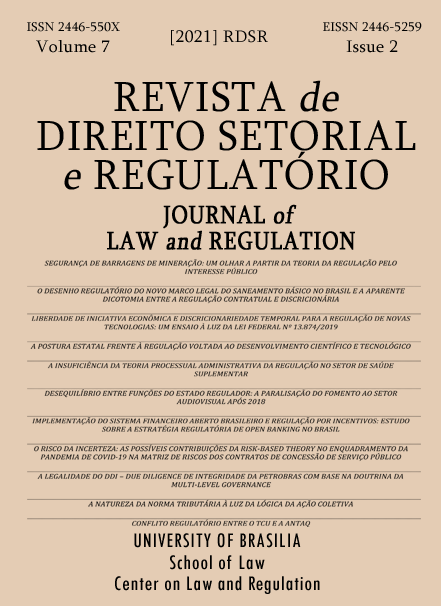O desenho regulatório do novo marco legal do saneamento básico no Brasil e a aparente dicotomia entre a regulação contratual e discricionária
Palavras-chave:
Saneamento Básico; Regulação do Saneamento; Supervisão Regulatória; Regulação Contratual; Regulação Discricionária.Resumo
[Propósito] Apresentar os principais pontos do novo marco legal do saneamento básico no Brasil, jogando luz à frequente discussão, não muito bem estruturada, sobre uma aparente dicotomia existente entre um modelo de regulação discricionário e um modelo de regulação contratual.
[Metodologia/abordagem/design] Aborda-se a aparente dicotomia existente entre regulação discricionária e contratual, muito em pauta com a aprovação do novo marco legal do saneamento básico, buscando identificar em que ponto da curva o setor do saneamento brasileiro se encontra.
[Resultados] O setor de saneamento brasileiro adota um modelo híbrido (regulação contratual e discricionária), porém, com o novo marco legal, passa a pender mais para o lado da regulação contratual. A calibração da balança dependerá, em grande medida, das normas de referência a serem elaboradas pela ANA e da adesão pelas agências infranacionais.
[Implicações práticas] As reflexões trazidas neste artigo poderão balizar novas pesquisas jurídicas a respeito das mudanças trazidas pelo novo marco legal do setor de saneamento, a exemplo das novas atribuições da ANA de supervisão regulatória de um setor cuja titularidade não é da União. Ademais, jogam um pouco de luz sobre a aparente dicotomia entre regulação discricionária e contratual.
[Originalidade/relevância do texto] O artigo traz pontos, ainda pouco debatidos no meio acadêmico, sobre as mudanças no novo marco legal do saneamento e abre possibilidades para investigações mais aprofundadas.
Downloads
Referências
ANDRADE, N. R. Regulação Responsiva no Setor de Águas: Propostas de Aperfeiçoamento do Desenho Regulatório Responsivo Brasileiro. Revista de Direito Setorial e Regulatório, Brasília, v. 4, n. 2, p. 41-60, outubro 2018.
ARAUJO, F. C. de; BERTUSSI, G. L. Saneamento Básico no Brasil: Estrutura Tarifária e Regulação. Revista Planejamento e Políticas Públicas. n. 51.jul/dez. 2018. p. 198.
BARROSO, Luís Roberto. Saneamento Básico: Competências Constitucionais da União, Estados e Municípios. Revista Eletrônica de Direito Administrativo e Econômico (REDAE). Salvador, Instituto Brasileiro de Direito Público, n. 11, agosto/setembro/outubro, 2007. Disponível em: < http://www.direitodoestado.com.br/redae.asp>. Acesso em: fez. 2021.
CARVALHO, A. G. P. de. A função regulatória dos contratos: regulação e autonomia privada na organização do poder econômico. Revista de Direito Setorial e Regulatório, Brasília, v. 5, n. 1, p. 91-114, maio 2019.
DUARTE, Stênio. Ambiente Regulatório do Setor de Saneamento no BrasiL: Limites e Possibilidades de Atuação da Agência Nacional de Águas Junto aos Entes Federados Subnacionais. 2019. 27 f. Monografia (Especialização) - Curso de Políticas de Infraestrutura, Escola Nacional de Administração Pública (Enap), Brasília, 2019.
DUTRA, Joisa; ENGEL, Pedro. Regulação no amanhecer da reforma. Revista Conjuntura Econômica, v. 74, n. 8, p. 51-53, 2020.
DUTRA, Joisa; LOUREIRO, Gustavo Kaercher. Regulação contratual ou discricionária no saneamento. Jota (online). Disponível em: <https://www.jota.info/opiniao-e-analise/artigos/regulacao-contratual-ou-discricionaria-no-saneamento-05042021>. Acesso em abr.2021.
EBERHARD, Anton. Infrastructure regulation in developing countries: an exploration of hybrid and transitional models. In: African Forum of Utility Regulators 3rd Annual Conference. 2007.
EHRHARDT, D. et al. Economic Regulation of Urban Water and Sanitation Services: Some Practical Lessons. World Bank Water Sector Board. Discussion Paper No. 9. 2007.
GOMES, M. C. Regulação deliberativa: em busca do interesse público na regulação de contratos de concessão de longo prazo. Revista de Direito Setorial e Regulatório, Brasília, v.4, n. 1,p. 79-110, maio 2018.
INSTITUTO TRATA BRASIL (2017). Benefícios Econômicos e Sociais da Expansão do Saneamento no Brasil. Disponível em: < http://tratabrasil.org.br/datafiles/estudos/beneficios-ecosocio/relatorio-completo.pdf>. Acesso em: abr. 2021.
JENSEN, Olivia; WU, Xun. The hybrid model for economic regulation of water utilities: mission impossible? Utilities Policy, v. 48, p. 122-131, 2017.
LOBO, Rodrigo Luiz Nascimento. O saneamento básico no Brasil: um estudo sobre a distribuição de investimentos públicos federais nas cidades médias entre 2004 e 2013. 2016.172 f. Dissertação (Mestrado em Planejamento Urbano e Regional)- Universidade Federal do Rio de Janeiro, Rio de Janeiro, 2016.
MARQUES, Rui Cunha. A reforma do setor de saneamento no Brasil: O reforço da regulação e do papel da ANA. In GRANZIERA, Maria; OLIVEIRA, Carlos (coord). Novo Marco do Saneamento Básico no Brasil. Editora Foco: Indaiatuba, 2020, p. 37–56.
MARRARA, Thiago. "Mosaico Regulatório": as normas de referência da ANA para a regulação dos serviços públicos de saneamento básico à luz da Lei 14.026/2020. In GRANZIERA, Maria; OLIVEIRA, Carlos (coord). Novo Marco do Saneamento Básico no Brasil. Editora Foco: Indaiatuba, 2020; p. 57–71.
OECD. “Case Studies of RegWatchEurope regulatory oversight bodies and of the European Union Regulatory Scrutiny Board”. OECD, 2018, Paris.
OLIVEIRA, Carlos Roberto. A regulação infranacional e o novo marco regulatório. In GRANZIERA, Maria; OLIVEIRA, Carlos (coord). Novo Marco do Saneamento Básico no Brasil. Editora Foco: Indaiatuba, 2020; p. 73–87.
RIBEIRO, Wladimir Antonio. Ministério da Cidades. Série “Apoio e Acompanhamento da Regulação do Saneamento Básico”. Relatório IV – Contribuições para o aprimoramento da atividade regulatória, 2016. Disponível em: http://www.cidades.gov.br/images/stories/ArquivosSNSA/Arquivos_PDF/regulacao/relatorio4/serie_regulacao_relatori o_IV_vf.pdf>. Acesso em ago.2018.
__________. O contrato de programa. In GRANZIERA, Maria; OLIVEIRA, Carlos (coord). Novo Marco do Saneamento Básico no Brasil. Editora Foco: Indaiatuba, 2020; p. 115–139.
TUROLLA, Frederico Araújo. Provisão e Operação de Infraestrutura no Brasil: no Setor de Saneamento. 1999. 94f. Mestrado em Economia. São Paulo. EAESPFGV, São Paulo, 1999.
Downloads
Publicado
Como Citar
Edição
Seção
Licença
Copyright (c) 2021 Journal of Law and Regulation

Este trabalho está licenciado sob uma licença Creative Commons Attribution 4.0 International License.
Ao submeter seu artigo à Revista de Direito, Estado e Telecomunicações, declaro aceitar a licença de publicação Creative Commons Attribution 4.0 International (CC BY 4.0), disponível em http://creativecommons.org/licenses/by/4.0.


